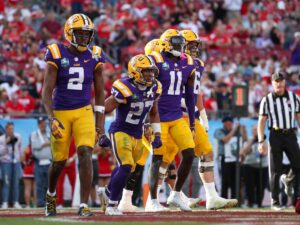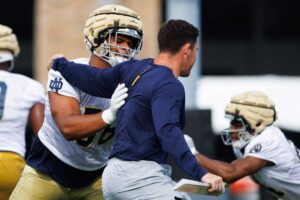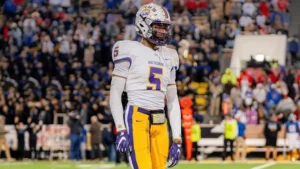
Travis Kelce Mocks NFL’s Hawk-Eye System with Jason Backing Him in a Brutally Honest Discussion
In the ever-evolving world of professional football, players rarely shy away from making their voices heard on issues that affect their game. From rule changes to technological advancements, the NFL players’ opinions on the sport’s progress hold significant weight. Travis Kelce, one of the league’s most celebrated tight ends, is no stranger to speaking his mind. Recently, Kelce took to a brutal, yet humorous, critique of the NFL’s Hawk-Eye system, with his brother, Jason Kelce, backing him up in a conversation that has resonated across the football world.
Travis, known for his larger-than-life personality, is as fearless in his locker room banter as he is on the field. This time, the topic at hand was the league’s use of the Hawk-Eye system, a technology designed to aid in officiating by providing more precise tracking of the ball, player movements, and other key in-game data. On the surface, Hawk-Eye seems like a natural evolution of technology in sports, aiming to remove human error from crucial decisions. However, Travis Kelce doesn’t share the same enthusiasm for the system, and his candid assessment has sparked a lively discussion about technology’s place in the NFL.
The Hawk-Eye system, which is primarily used for line calls and spotting the ball in critical moments, is already a familiar tool in other sports like tennis and cricket. Its ability to analyze and track movements with high accuracy is invaluable in those games. The NFL’s adoption of this technology was hailed as a necessary step forward. The system uses multiple cameras positioned around the field to track the ball’s trajectory, player movements, and even to help spot certain penalties or infringements. It’s designed to provide an additional layer of oversight and precision, ensuring that calls made on the field are as accurate as possible.
But for Kelce, a player who thrives in the trenches of tight-end warfare, the Hawk-Eye system feels like more of an intrusion than a help. Speaking candidly on his podcast, “New Heights” (co-hosted with his brother Jason Kelce), Travis didn’t mince words when it came to his feelings about the Hawk-Eye system’s role in the game. He poked fun at its accuracy, or rather, its perceived lack thereof. The tight end described the technology as “a little too eager” to make calls that, in his mind, were better left to the human element of the game. Kelce’s jab was loaded with the kind of humor that has made him a fan favorite, but beneath the jokes, there was a real critique about how much technology should be relied upon in the fast-paced environment of an NFL game.
“I feel like the Hawk-Eye is trying to take over,” Kelce quipped. “Next thing you know, it’ll be deciding if I’m allowed to block a guy or not. You get some guys out there calling penalties based on where the Hawk-Eye thinks the ball is, and it’s just not always right.” His criticism comes from a place of experience. Kelce, one of the league’s most reliable and skilled players, understands the flow of the game better than most. To him, the Hawk-Eye system feels like an overcomplication of something that’s already working well in many cases: human judgment.
The issue, according to Travis, isn’t necessarily that technology like Hawk-Eye isn’t useful—it’s that it may be taking away from the very spirit of the game. Football, unlike sports like tennis or cricket, is fast, chaotic, and often unpredictable. Players are constantly on the move, making split-second decisions that can have profound consequences. In this environment, where the margins are razor-thin, the idea of a computer or camera system dictating what’s “correct” in a fast-paced moment can feel like a disruption of the human side of the sport.
Jason Kelce, Travis’s older brother and a stalwart in the NFL as a center for the Philadelphia Eagles, chimed in to add his own perspective. Known for his leadership on and off the field, Jason took a more measured stance in his support of Travis’s argument. While Jason recognized the value of technology in making the game more fair, he was also quick to emphasize the importance of the human factor in decision-making.
“There’s definitely a place for technology,” Jason explained, “but when you’re talking about the flow of the game and the timing of a penalty or a spot, it’s a whole different dynamic. Sometimes, you need the ref to make a quick decision based on what’s happening right in front of him, not what some camera on the sideline tells him.” Jason’s insight highlights a central debate that has divided fans and players alike: when does technology enhance the game, and when does it overstep its bounds?
Kelce’s criticism of Hawk-Eye isn’t just about the immediate impact it has on the game but also the broader implications it has for how players and coaches approach football. The NFL, a league where every play counts and every inch matters, has been reluctant to embrace full automation in officiating, but the introduction of tools like Hawk-Eye signals a shift toward increasing reliance on technology to inform decisions. Whether it’s spotting a fumble or determining if a touchdown is legitimate, the Hawk-Eye system plays a key role in these calls.
However, Travis and Jason Kelce’s remarks touch on something deeper. There’s a growing tension in many sports, especially in football, between preserving the authentic nature of the game and embracing technological advancements that promise greater accuracy. The NFL has long prided itself on its human element—the referees and officials on the field who make calls in real-time. Kelce’s argument is that if technology continues to step in and dictate too many of these decisions, it may diminish the visceral nature of the sport, which relies on human judgment and the unpredictability of game flow.
“Do I think the Hawk-Eye system is perfect? No,” Travis added, as he poked fun at the technology’s occasional flaws. “Look, sometimes it’s right, but a lot of times it’s got a mind of its own. And when it comes down to a game-winning drive or an important decision, I don’t want a camera making that call. I want a human out there, doing what they do best.” For Kelce, this goes beyond personal preference; it’s about the essence of football. In a game filled with intense rivalries and high-pressure situations, the feeling that everything hinges on the immediate decisions made by referees and players is one of the sport’s trademarks.
Of course, there’s no denying that the NFL is a rapidly changing landscape, with advancements in technology coming at a breakneck pace. From next-gen stats to digital player tracking, the league is embracing the possibilities that technology brings. Some fans and analysts argue that tools like Hawk-Eye are a natural progression for the sport. After all, other sports have successfully integrated similar systems, and in those contexts, they’ve proven to be valuable aids for ensuring accuracy and fairness.
Yet, Travis Kelce’s mockery of the Hawk-Eye system isn’t just about rejecting technological progress; it’s about making sure that the integrity of the game is maintained. For him, it’s not a question of whether technology has a role in football, but rather how much of it is appropriate. He, like many other players, understands that football’s charm lies in its unpredictability and the decisions made under pressure. In a world where everything is being increasingly digitized, the question remains: can the NFL strike the right balance between embracing technology and preserving the raw, human-driven essence of the sport?
As the discussion continues to evolve, one thing is certain—Travis Kelce’s remarks have resonated with many in the NFL community. Whether it’s fellow players, coaches, or fans, Kelce’s brutal honesty has sparked a broader conversation about the role of technology in football. Whether Hawk-Eye is the future of officiating or just another tool in the toolbox, only time will tell. But for now, players like Travis and Jason Kelce are reminding us that the NFL, at its core, is about the game, the players, and the unpredictable moments that make it so special.





